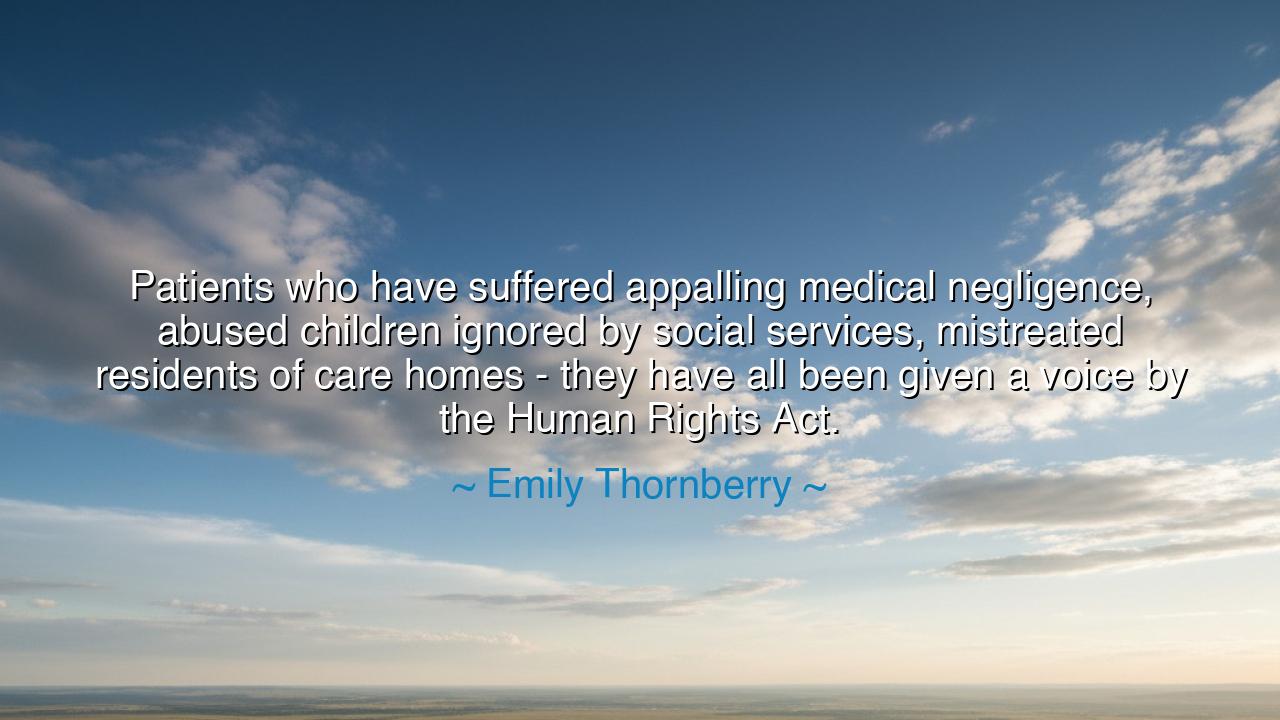
Patients who have suffered appalling medical negligence, abused
Patients who have suffered appalling medical negligence, abused children ignored by social services, mistreated residents of care homes - they have all been given a voice by the Human Rights Act.






The words of Emily Thornberry—“Patients who have suffered appalling medical negligence, abused children ignored by social services, mistreated residents of care homes – they have all been given a voice by the Human Rights Act.”—resound like a clarion call across the halls of justice. They speak of the voiceless, of those who were once silenced by power, neglect, or cruelty, and of a law that became their shield. In these words lives the spirit of compassion made law—the recognition that the dignity of a single human being is the foundation upon which all civilization stands. Thornberry’s declaration reminds us that the Human Rights Act is not a mere parchment of politics, but a living covenant between humanity and its conscience.
At its heart, her quote illuminates the purpose of law not as an instrument of control, but as a guardian of the powerless. For centuries, the poor, the sick, and the forgotten were left to suffer in silence. Hospitals turned away the destitute, institutions abused the weak, and children were abandoned behind the closed doors of bureaucracy. But the rise of human rights brought forth a new light—a principle that no government, no corporation, and no individual could stand above the inherent worth of a person. The Human Rights Act, in this sense, became not merely legislation, but a modern expression of an ancient truth: that justice without compassion is hollow, and authority without accountability is tyranny.
To understand the origin of Thornberry’s words, we must look to the spirit of post-war Europe, when the world, still trembling from the atrocities of the Second World War, vowed that never again would humanity allow such cruelty to thrive unchecked. From that resolve was born the European Convention on Human Rights, and from it, in the United Kingdom, the Human Rights Act. It was crafted not for the powerful, but for the vulnerable—for the patient denied fair treatment, for the child unseen by the state, for the elder left to waste in neglect. Thornberry’s statement honors that sacred intent: to ensure that every individual, no matter how frail or forgotten, might stand before the law and say, “I am human, and therefore I have rights.”
History itself offers living proof of her words. One recalls the story of Harold Shipman’s victims, whose families, denied justice for years, finally found a path through the framework of human rights law. Or the Hillsborough disaster, where the bereaved families of ninety-six souls used the Human Rights Act to demand truth from a system that had long sought to bury it. These are not tales of policy—they are epics of endurance, where ordinary people, armed only with the conviction of justice, faced institutions of indifference and prevailed. Thornberry’s quote honors these unseen warriors of humanity—the mothers, fathers, and survivors who turned their suffering into a voice that the world could no longer ignore.
Her words also awaken the ancient moral principle that a society is judged by how it treats its weakest members. In the days of Rome, the philosopher Seneca wrote that mercy is the highest virtue of power. In the scriptures of old, the prophets cried that the widow, the orphan, and the stranger must never be abandoned. Thornberry’s declaration is the modern echo of those eternal teachings. It is the reminder that in an age of bureaucracy and ambition, we must never let the human heart be drowned by the machinery of institutions. The Human Rights Act, then, is not only a law—it is a mirror reflecting the soul of a nation.
There is, too, a quiet courage in her tone—a recognition that rights are not gifts bestowed by the powerful, but claims earned through struggle and vigilance. For every law that protects the innocent, there were once voices raised in defiance, often unheard, often punished. The Human Rights Act stands as the fruit of those voices. It is the law that insists that silence shall not mean consent, and suffering shall not go unseen. Thornberry reminds us that these protections, though codified in law, are fragile—they live only so long as citizens defend them. The same hands that built the l






AAdministratorAdministrator
Welcome, honored guests. Please leave a comment, we will respond soon